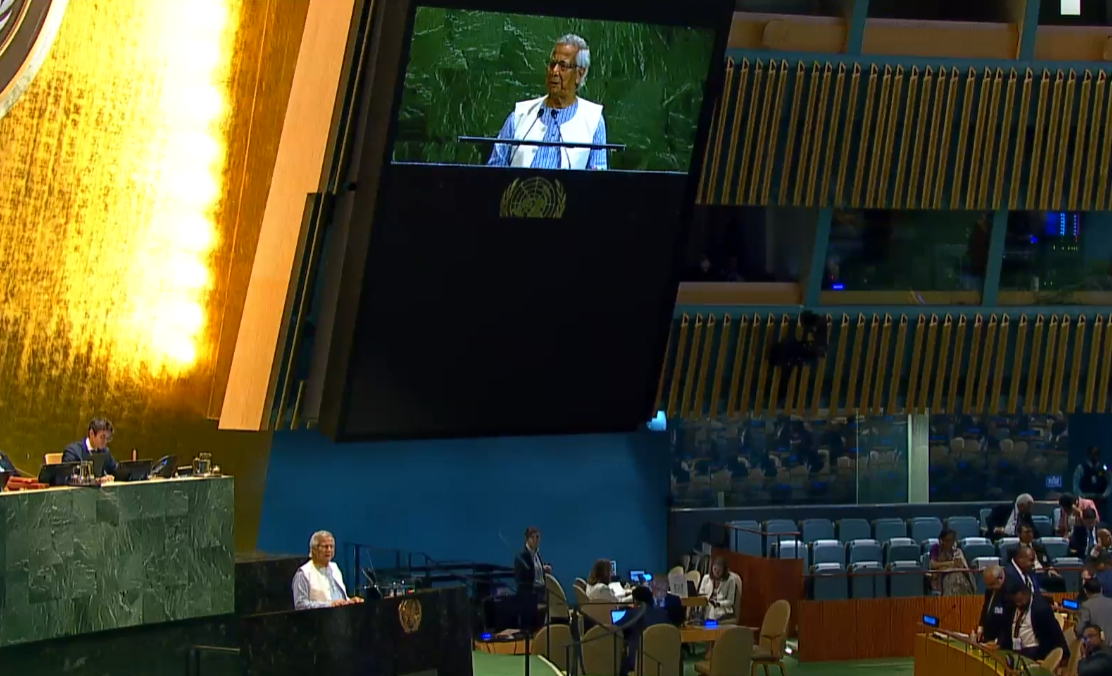News Flash

NEW YORK, Sept 26, 2025 (BSS) – Chief Adviser Professor Muhammad Yunus today said that Bangladesh has embarked on historic reforms aimed at stabilizing its economy, ensuring financial transparency, and empowering its youth while calling for safe migration and fair access to technology for developing countries.
“Alongside historic reforms in revenue, we have introduced a market-based exchange rate, brought discipline and stability to the banking sector through asset quality reviews, a new Bank Resolution Ordinance, and a forthcoming Deposit Protection Ordinance,” he said while addressing the United Nations General Assembly (UNGA) here.
The Chief Adviser added: “We have modernized capital market oversight with a reform task force and a strengthened investigative system. In public procurement, e-tendering is now mandatory, and conflicts of interest must be disclosed. A new Public Accounts Audit Ordinance has reinforced accountability”.
Bangladesh is also working to create an investment-friendly environment with a Single Window system linking 19 agencies to simplify customs procedure, he said, adding, specialized commercial courts have been established to expedite dispute resolution.
The Investment Development Authority has set up a coordination committee to ensure smooth one-stop services, bringing regulators under one roof and easing visa and work permit processes, Professor Yunus said, adding, an FDI Heatmap and a National Semiconductor Task Force now provide transparent information on high-potential sectors.
“Trade logistics are also improving. Year on year, container handling at Chattogram Port grew by 27.6 percent in August, a striking sign of new efficiency. These initiatives strengthen economic governance and make investment safer. Bangladesh is now entering a new phase of sustainable and inclusive growth,” he said.
Yunus praised the “extraordinary contribution” of migrant workers, who send record remittances that support Bangladesh’s economy while benefiting host nations.
He reaffirmed Bangladesh’s support for safe, orderly, and regular migration, urging receiving countries to ensure protection for workers.
“We are advancing labor rights reforms in line with our commitments . . . as a sign of our commitment to workers’ rights, we have also signed the Charter of the OIC Labor Center. For these reasons, we strongly support safe, orderly, and regular migration,” the Chief Adviser said.
He called upon all countries that receive migrant workers to ensure empathy and protection for them.
Highlighting that over 60 percent of Bangladesh’s population is under 35, Professor Yunus said, “If migration pathways are opened, it will be mutually beneficial. By harnessing the strength of our youth, we can help meet labor needs in developed countries while creating opportunities for our own people”.
Noting that the young generation of Bangladesh has already shown that they are the driving force of social change, he said, “We are investing in their skills: in information technology, artificial intelligence, renewable energy, and green innovation. Our goal is clear: to shape every young person not only as a job seeker, but also as a job creator.”
Marking the 30th anniversary of the World Programme of Action for Youth, he said, “It is not only a moment to address the challenges of today’s young people, but also to anticipate the crises they will face tomorrow, and to begin shaping the solutions”.
“In this fast-changing technological era, one of our deepest concerns is the widening digital divide facing youth in the developing world. Quantum computing, artificial intelligence, large language models, modern communications systems: these must not be biased, and their benefits must be shared fairly with all.
“If not, we risk creating an entire generation who will see themselves as excluded, marginalized, and treated unjustly. Such a generation will be vulnerable to every harmful temptation,” Professor Yunus added.
The Chief Adviser emphasized that beyond technological innovation, the world needs social innovation.
Citing Bangladesh’s pioneering role in microcredit and the global spread of social business, he said profits reinvested for social good can address major challenges such as poverty, unemployment, and environmental degradation.
“Social business has shown that the entrepreneurial spirit of every human being can be harnessed for the welfare of society and the solving of social problems,” Professor Yunus said.